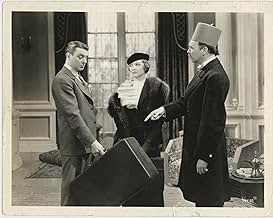I watched this more for Myrna Loy than for George Brent, whom I'd always considered wooden and stolid. Imagine my surprise to see a playful, puppyish Brent, with only a few small foreshadowings of his priggish side.
Myrna Loy is even more beautiful than usual, in a series of spectacular gowns (most notably one that is backless, nearly sideless, with a front that consists mostly of a flower, two rhinestone straps, and good intentions). She plays a German counter-espionage spy, Fraulein Doktor, who is notorious in many countries for her skill at getting information. It is clear that she didn't mind using sex to do so, which must have made negotiations with the Hays Office more fraught than usual.
There was a real Fraulein Doktor, who had run a school for spies in Belgium. She was still alive when the film was made (though suffering from drug addiction in a Swiss sanitorium), so the writers and producers had to tread carefully in their depiction of her. Loy's trademark sang-froid serves her well as she jokes about missions with her boss (the excellent Lionel Atwill), manipulates targets, and deals with the smitten Brent. The plot twists and twists and then twists a final time (just when you think you've anticipated the double-crosses, there's one last to surprise you). The cautionary references to Mata Hari help ground the story in its historical context.
The cast is great fun, with Mischa Auer as an efficient aide-de-camp, Leo G Carroll as a double-agent, and the wonderfully villainous C. Henry Gordon as Fraulein Doktor's main target.
The end, however, is simply odd. One hardly knows what to make of that final scene--it seems almost like an hallucination. Its unsatisfactory cap to the movie led me to give it a lower rating than I would have otherwise.




































